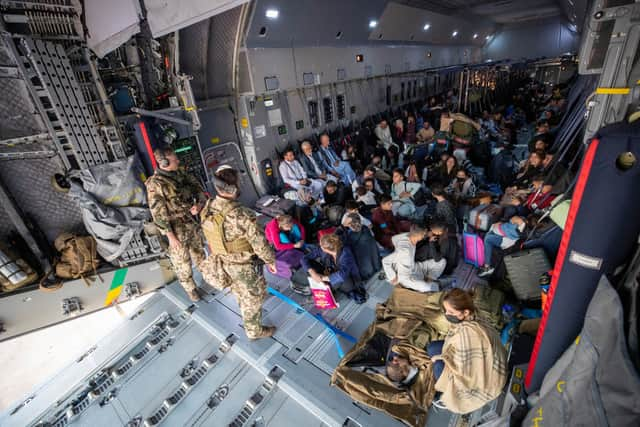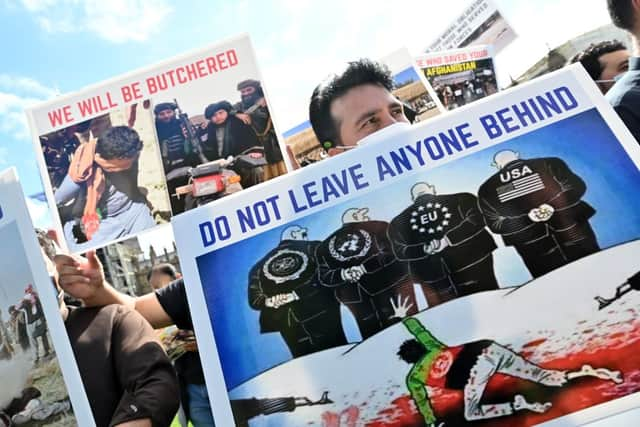Tom Tugendhat: what did Conservative MP and former soldier say about Afghanistan - his Commons speech in full
This article contains affiliate links. We may earn a small commission on items purchased through this article, but that does not affect our editorial judgement.
and live on Freeview channel 276
A former soldier-turned-Conservative MP warned Afghanistan “damn well feels like” defeat, as he urged a fresh “vision” must be developed to help.
Tom Tugendhat, who served in Afghanistan, was applauded following an emotive Commons speech in which he recalled his experiences in the country.
Advertisement
Hide AdAdvertisement
Hide AdHe was also among several MPs to criticise US President Joe Biden and his predecessor Donald Trump for their decision to withdraw US forces from Afghanistan.
But what exactly did he say?
Here is everything you need to know.
What did Tom Tugendhat say?
Addressing a silent Commons, Tugendhat said he had struggled through “anger, grief and rage” over the past week and noted he had previously watched “good men go into the earth, taking with them a part of me and a part of all of us”.
He touched on the efforts of the military, aid workers, journalists and others before noting: “I know that we’ve all been struggling and if this recall has done one thing… I’ve spoken to the Health Secretary, he’s already made a commitment to do more for veterans’ mental health.”
Tugendhat said it was with “great sadness” that he was to criticise the US, noting: “To see their commander in chief (President Joe Biden) call into question the courage of men I fought with, to claim that they ran is shameful.
Advertisement
Hide AdAdvertisement
Hide Ad“Those who have not fought for the colours they fly should be careful about criticising those who have.”
Tugendhat suggested the West and the UK had not shown patience, adding: “This is a harsh lesson for all of us and if we’re not careful it could be a very, very difficult lesson for our allies. It doesn’t need to be.
“We can set out a vision, clearly articulate it, for reinvigorating our European Nato partners, to make sure that we are not dependent on a single ally, on the decision of a single leader, that we can work together with Japan and Australia, France and Germany, with partners large and small and make sure we hold the line together.”
He ended by recalling his time as an adviser to the governor of Helmand and the “joy” given to families by the opening of schools for girls, adding: “I didn’t understand it until I took my own daughter to school about a year ago.
Advertisement
Hide AdAdvertisement
Hide Ad“There was a lot of crying when she first went in, but I got over it and it went okay. I’d love to see that continue.”


He left MPs with a second, “harder” image, which he explained: “It’s one that the forever war that has just reignited could lead to.
“It is the image of a man whose name I never knew, carrying a child who had died hours earlier, carrying this child into our fire base and begging for help.
“There was nothing we could do. It was over. This is what defeat looks like when you no longer have the choice of how to help. This doesn’t need to be defeat but at the moment it damn well feels like it.”
Tom Tugendhat’s speech in full:
Advertisement
Hide AdAdvertisement
Hide Ad“Like many veterans, this last week has been one that has seen me struggle through anger, grief and rage. The feeling of abandonment, not just of a country but of the sacrifice that my friends made.
“I’ve been to funerals from Poole to Dunblane; I’ve watched good men go into the earth, taking with them a part of me and a part of us all. And this week has torn open those wounds, left them raw, left us all hurting.
“I know it’s not just soldiers. I know aid workers and diplomats who feel the same way. I know journalists who’ve been the witnesses to our country in its heroic effort to save people from the most horrific fates.
“This isn’t just about us. The mission in Afghanistan wasn’t a British mission, it was a Nato mission. It was a recognition that globalisation has changed us all.
Advertisement
Hide AdAdvertisement
Hide Ad“The phone calls that I am still receiving, the text messages that I have been answering, putting people in touch with our people in Afghanistan, reminds us that we are connected.
“Afghanistan is not a far away country about which we know little. It is part of the main. That connection links us also to our European partners, to our neighbours and our international friends.
“And so it is with great sadness that I now criticise one of them. Because I was never prouder than when I was decorated by the 82nd Airborne after the capture of Musa Qala.
“It was a huge privilege to be recognised by such an extraordinary unit in combat. To see their commander-in-chief call into question the courage of men I fought with — to claim that they ran. It is shameful.
Advertisement
Hide AdAdvertisement
Hide Ad“Those who have never fought for the colours they fly should be careful about criticising those who have. Because what we have done, in these last few days, is we’ve demonstrated that it’s not armies that win wars.
“Armies can get tactical victories and operational victories that can hold a line. They can just about make room for peace, make room for people like us, parliamentarians, to talk, to compromise, to listen.
“It’s nations that make war. Nations endure. Nations mobilise and muster. Nations determine, and have patience.
“Here we have demonstrated, sadly, that we, the West — the United Kingdom — do not have patience. Now, this is a harsh lesson for all of us and if we are not careful it could be a very, very difficult lesson for our allies.
Advertisement
Hide AdAdvertisement
Hide Ad“And it doesn’t need to be. We can set out a vision, a clear articulated vision, for reinvigorating a European-Nato partnership, to make sure we are not dependent on a single ally, on the decision of a single leader, but that we can work together with Japan and Australia, with France and Germany, with partners large and small, and make sure we hold the line together.
“We know that patience wins. We know it because we have achieved it, we know it because we have delivered it. The Cold War was won with patience. Cyprus is at peace with patience.
“South Korea, with more than ten times the number of troops that America had in Afghanistan, is prosperous through patience.
“So let’s stop talking about ‘forever wars’, let’s recognise that forever peace is not bought cheaply — it is hard. It is bought through determination and the will to endure.
Advertisement
Hide AdAdvertisement
Hide Ad“The tragedy of Afghanistan is that we are swapping that patient achievement for a second fire and a second war.
“Now we need to turn our attention to those who are in desperate need, to supporting the UNHCR, the World Food Programme and so many other organisations who can do so much for people in the region.
“Yes to support refugees, though it’s unnecessary to get into the political auction of numbers. We just need to get people out. So I leave with one image.
“In the year that I was privileged to be the adviser to the governor of Helmand province, we opened girls’ schools. The joy it gave parents, seeing their little girl going to school, was extraordinary.
Advertisement
Hide AdAdvertisement
Hide Ad“I didn’t understand it until I took my own daughters to school about a year ago. There was a lot of crying when she first went in, but I got over it.
“But there is a second image that I must leave you with and it is a harder one. But I am afraid it is one I think we must all remember. The second image is one that the forever war that has just reignited could lead to.
“It is the image of a man whose name I will never know carrying a child who had died hours earlier, carrying this child into our base and begging for help. There was nothing we could do. It was over.
“This is what defeat looks like: when you no longer have a choice of how to help. This doesn’t need to be defeat — but at the moment, it damn well feels like it.”
Who else has spoken out against Biden and Johnson?


Advertisement
Hide AdAdvertisement
Hide AdConservative former foreign secretary Jeremy Hunt also criticised the US.
He said: “President Biden said this week that his only vital national interest in Afghanistan was to prevent a terrorist attack.
“Even if that is the case, both he and President Trump should be deeply ashamed, and I say this with great sadness, because their actions have returned Afghanistan to the very government that harboured the 9/11 bombers.”
Dan Jarvis, Labour MP for Barnsley Central, who served in the British armed forces in Afghanistan, spoke of the service and sacrifice of the “brave” British servicemen and women “who throughout showed outstanding professionalism and courage”.
Advertisement
Hide AdAdvertisement
Hide AdHe went on: “It was particularly distasteful and dishonouring of President Biden to make reference to the lack of courage and commitment by those Afghan soldiers who have served with such bravery and distinction.”
Veteran and Conservative former defence minister Johnny Mercer also accused Prime Minister Boris Johnson of “consistently failing” to support former soldiers properly, and warned there would be a “bow wave” of mental health issues among veterans following the withdrawal from Afghanistan.
He added: “The Prime Minister must not wriggle out of his commitments on this issue. The Office for Veterans’ Affairs is nothing like it was designed to be and he knows that.”
A message from the editor:
Thank you for reading. NationalWorld is a new national news brand, produced by a team of journalists, editors, video producers and designers who live and work across the UK. Find out more about who’s who in the team, and our editorial values. We want to start a community among our readers, so please follow us on Facebook, Twitter and Instagram, and keep the conversation going.
Comment Guidelines
National World encourages reader discussion on our stories. User feedback, insights and back-and-forth exchanges add a rich layer of context to reporting. Please review our Community Guidelines before commenting.
